In Japanese, okama オカマ means an effeminate man, gay man, or trans woman. Some people call themselves okama, as do some establishments, e.g. okama bars. The term is sometimes considered pejorative, and other terms, like newhalf ニューハーフ, may be preferred instead.
The homonym okama お釜 means a type of cooking "pot" instead.
Fujioka Ryouji 藤岡涼二
Grell Sutcliff, グレル・サトクリフ
Puripuri Prisoner ぷりぷりプリズナー
Nathan Seymour, ネイサン・シーモア
O. D.
Hana ハナ
Leeron Littner リーロン・リットナー
Nuriko 柳宿
Anime: Ouran High School Host Club, Ouran Koukou Hosuto-Bu 桜蘭高校ホスト部 (Episode 10)
Anime: Black Butler, Kuroshitsuji 黒執事 (Episode 5)
Anime: One Punch Man, ワンパンマン (Episode 8)
Anime: Tiger & Bunny (Episode 6)
Anime: Gatchaman Crowds, ガッチャマン クラウズ (Episode 11)
Anime: Tokyo Godfathers, 東京ゴッドファーザーズ (Movie)
Anime: Tengen Toppa Gurren Lagann, 天元突破グレンラガン (Episode 12)
Anime: Fushigi Yuugi ふしぎ遊戯 (Episode 5)
Definition
Like many such terms, okama is a vague and ill-defined word.
Someone who was born male and acts femininely is called an okama. What this means, exactly, varies:
- The okama is a gay man, because liking men is something women do.
- gei
ゲイ
Gay. - homo
ホモ
Homo. (considered offensive.) - dou-sei-ai-sha
同性愛者
Same-sex-love-person.
Homosexual person.
- gei
- The okama is a crossdresser, because wearing women's clothes is something women do.
- The okama is a trans woman, because she does as women do.
- toransujendaa
トランスジェンダー
Transgender. - onna no kokoro
女の心
[Having] the heart of a woman. (in the sense of identifying as a woman.)
- toransujendaa
- The okama is a guy who has feminine or unmanly mannerisms.
- nayonayo suru
なよなよする
To act delicately.
- nayonayo suru
- The okama is a guy who speaks femininely.
Someone can be called an okama for any of the reasons above, and could call themselves an okama for multiple reasons, too, so it's not possible to say, for example, if an okama is a trans woman or a gay man, based only on the fact they're an okama.
In general, okama tends to not be used toward men who are simply gay. The term historically referred to transvestite prostitutes, so the idea that an okama has to appear feminine (to attract men) remains.
Furthermore, it's not even necessarily the case that an okama is either gay or transgender. You could have a celebrity that acts the okama archetype in spite of being an cisgender heterosexual man, e.g. a drag queen.
Slur
The term okama is sometimes used as a slur, which would refer to any effeminate natal man. In this case, I guess you could translate it to English as the slurs "faggot" or "tranny," depending on context.
Some people prefer newhalf as a more politically correct alternative, while others think both terms mean the same thing, or mean different things.
These terms are particularly considered offensive toward post-op trans women, who would rather just be referred to as women.
In any case, it's better not to call anyone an okama.
Okama-san
The phrase okama-san オカマさん is an attempt at making the word okama not sound offensive when referring to a person by attaching attaching the respectful ~san ~さん honorific to it.
The phrase okama-chan オカマちゃん is a diminutive variant with the ~chan ~ちゃん suffix instead.
Bar
An "okama bar," or okama baa オカマバー, is a bar with featuring male transvestites and trans women. It differs from the typical gay bar ゲイバー in that the staff of an okama bar wears female clothes.(detail.chiebukuro.yahoo.co.jp)
Anime: Tokyo Godfathers, 東京ゴッドファーザーズ (Movie)
- Context: Hana singing in an okama bar.
Some related terms include:
- aijin
愛人
Lover.- Such bars can become a venue for hosts or hostesses to end up in a relationship with their clients.
- If they give gifts in exchange, that makes it a form of transactional relationship, i.e. compensated dating, prostitution.
- A man who engages in compensated dating financially supporting a young woman is called a papa パパ in Japanese, in the sense of "[sugar] daddy." The practice is called papa-katsu パパ活.
- mama
ママ
Mother.
The female owner of a bar. Also counts if the owner is an okama.
A sugar mommy, who financially supports a young man in compensated dating. The practice is called mama-katsu ママ活 in this case.
The Japanese law against prostitution is worded in such way that only prohibits selling intravaginal sex, leading to the surreal situation in that homosexual prostitutes legally can't exist in Japan.(news.yahoo.co.jp)
- shuin ya kouin to itta seikou-ruiji koui wa fukumarenai shi, douseikan dewa baibaishun to naranai.
手淫や口淫といった性交類似行為は含まれないし、同性間では買売春とならない。
Sexual acts such as masturbation and oral sex aren't included, and homosexual relationships [don't count] as prostitution.
Some examples of okama characters that have worked in such bars include:
- Fujioka Ryouji 藤岡涼二, from Ouran High School Host Club.
- Hana ハナ, from Tokyo Godfathers 東京ゴッドファーザーズ.
- Momoko モモコ, from Shangri-La シャングリ・ラ. She calls herself a newhalf.
Characters
In anime, an okama character is typically a character that was born male, likes men, and deliberately expresses themselves femininely or dresses like a woman.
Such characters tend to be flamboyant and harass other male characters, which makes it extremely easy to figure out what characters are supposed to be okama characters.
Anime: Black Butler, Kuroshitsuji 黒執事 (Episode 11)
- Context: Grell, who is a shinigami 死神, "grim reaper," strikes a tehe-pero てへぺろ pose complete with a star coming out of the wink but using the corna (ILY?) sign instead of the usual peace sign.
- kore demo shitsuji desu☆
これでも執事デス☆
Even [like] this, [I] am a butler.- She pronounces the polite copula desu です like the katakanization of "death," desu デス, as a form of wordplay.
They're distinct from otokonoko 男の娘 characters, boys that look like girls, i.e. "trap" characters, although sometimes these three different terms overlap.
An otokonoko character is a boy that was drawn like a girl by the author to fit the otokonoko trope. The point is to make the character look like a girl, so they pretty much always look like one, and may be mistaken for one, and perhaps confessed to by guys.
In spite of this, otokonoko characters generally aren't trying to pass as girls, nor are they interested in guys, just like an average male character wouldn't be.
- Context: a guy confesses to his skirt-wearing "childhood friend," osananajimi 幼馴染, who's called Osana Najimi 長名なじみ.
- Najimi!
なじみ! - ore to tsuki-atte ku
俺と付き合ってく
Will you date wi—
- ~te-kureru ~てくれる - to do something for me, used when asking favors, "please."
- muri.
ムリ。
[No way.] (literary "impossible.") - boku, otoko dashi.
ボク、男だし。
I'm a guy.
By contrast, an okama character is an okama drawn as an okama by the author, by dumping a lot of okama stereotypes together.
It's usually very obvious that the okama character is an okama, because they will do things like:
- Literally calling themselves an okama or newhalf.
- Flirting with male characters.
- Tendency to give romantic advice to men.
- Saying they have the heart of a woman, calling themselves delicate, pure as a maiden, etc.
- Wearing pink and makeup, lipstick, mascara, etc, heavy enough for it to get drawn.
- Working in an okama bar.
- Speaking femininely.
A more practical distinction is that almost every otokonoko character is underage, while almost every okama character is an adult.
This is due to the stereotype that an okama has had sex with men, and wants to have more sex with men, has male lovers, etc.
In high school anime, nobody has sex at all, which makes absolutely no sense, statistically speaking.
The stories are all about romantic relationships, or romantic-comedies, so the whole thing always stops at romance for the main character, and nobody besides the main character is even in a romantic relationship, much less in a gay relationship.
- In R-15, Enshuu Ritsu 円修律 is a guy in love with the male protagonist.
- In Haiyore! Nyaruko-san 這いよれ!ニャル子さん, Hasuta ハスタ is an otokonoko character in love with the male protagonist.
In the few instances there is a gay character, they're just a gay character. They won't identify as a woman.
By contrast, when there's an okama character, they're likely to call someone a "hot guy," ikemen イケメン, and flirt with them. That hot guy probably doesn't feel like it (nonke ノンケ), as it's unlikely two gay characters are going to appear in a non-BL anime.
Another way to distinguish these two types of characters is by speech.
Since otokonoko characters only appear feminine unconsciously, due to reasons beyond their control, the one thing they have control over, their speech, isn't going to be feminine. By contrast, okama characters will speak femininely pretty much every time.
Speech
In Japanese, language is gendered in that some words are typically used by women, while others by men.
For example, the pronouns ore 俺 is masculine, and most men will use this pronoun if the situation allows. The pronoun boku 僕 sounds softer, but it's also only used by men. In formal contexts, men may use watashi 私, which would normally be used by women in informal contexts.
On the other hand, atashi あたし is feminine. If a man uses atashi, chances are he's deliberately expressing himself femininely, which could mean he's actually a trans woman, but there's no way to know that without asking them.
The pronoun uchi うち is also considered feminine, but in some regions of Japan it's also normally used by men.
Language used by women is called "woman's language," onna-kotoba 女言葉, and it includes all sorts of phrases.
An overly feminine variant of this language is called onee-kotoba オネエ言葉, literally "onee's language." It's similar to the "gay lisp" in that gay men and trans women end up speaking in a manner more feminine than the average woman would for some reason.
If a character looks like a man, but ends their sentences with:
- na no yo なのよ
- wa yo わよ
- da wa yo だわよ
- desu wa yo ですわよ
- wa ne わね
- desu wa ne ですわね
- kashira かしら
And uses words like yada やだ, mou もう, tara たら, chau ちゃう, and desho でしょ which aren't exactly feminine, but that end up being used by okama characters, then that's probably an okama character.
- Context: a guy panicked so hard he started speaking in onee-kotoba.
- panikku de onee-kotoba
パニックでオネェ言葉
[Using] onee-kotoba due to panic. - e' yada sore jaa
えっ やだ それじゃあ
[Eh, no way, then that means...]
オネエ
Someone who uses onee-kotoba is called an onee オネエ, or onee-kei オネエ系, "onee type," although this term is sometimes improperly used like a replacement for okama.(mainichi.jp)
- "onee" wa honrai, "onee-kotoba" nado {gei no kochou shita} josei-kotoba ya {shina wo tsukutta} furumai wo sashite tsukawarete-ita hazu. ima wa {{jinshu ya zokusei no} you ni} atsukaware, {onee-kotoba wo tsukatte-inai} gei ya {josei toshite ikite-iru} hito ni made tsukawarete-iru.
『オネエ』は本来、『オネエ言葉』などゲイの誇張した女性言葉やしなを作った振る舞いを指して使われていたはず。今は人種や属性のように扱われ、オネエ言葉を使っていないゲイや女性として生きている人にまで使われている。
Originally, "onee" was used to refer to "onee-kotoba," female language {exaggerated by gays} and [their] {coquettish} mannerisms. Now, [it] is treated {like {a type of person or attribute}}, being used toward gays [that] {don't use onee-kotoba} and even people {living as women}.
Not to be confused with onee お姉, which means "older sister" or a "young girl" instead.
ホゲる
The term hogeru ホゲる means "to speak using onee-kotoba," or "to act effeminately (like an okama)."
For example, some okama may hogeru among friends, socially, but not hogeru in other situations, like among straight people, in formal events, etc.
In Kyuushuu, hogeru means "to open [a hole]."
Origin
The origin of the term okama is a bit complicated.(dic.nicovideo.jp)
Apparently, kiku 菊, "chrysanthemum," was once used to refer to homosexual people. This term also meant "anus."
In the Edo period (1603–1868), kiku きく was transformed into kakema かけま.
In the gojuon 五十音 ordering of the Japanese kana, the K-row of syllables looks like this:
| ka か |
ki き |
ku く |
ke け |
ko こ |
The syllables ki く and ku く are between ka か and ke け. The term kakema かけ間 means the "space," ma 間, between ka か and ke け, which is equal to kiku きく.
Who even came up with this?
When written with kanji, kakema かけま would become kakema 陰間.
Because the reading of the 陰 kanji is usually kage かげ, not kake かけ without a dakuten 濁点, some people ended up reading it as kagema instead of kakema.
Then, the honorific prefix o~ お~ was added, okakema おかけま, and it eventually morphed into the word okama おかま.
Probably.
This term was also used toward male prostitutes. Places where men who liked men gathered were called kagemachaya 陰間茶屋, meaning "okama tea-house."
Pot
Another theory is that okama オカマ comes from the word okama お釜 instead, which is a kind of "pot" using in cooking.
Although it's true that today people do think the two words are related, it's entirely possible that the pot and the gay word just coincidentally sound alike and people started mixing up the two.
Man's Butt
The term okama is also used to refer to a man's ass. Why? Probably because the bottom of an okama pot is round.
Euphemisms
For reference, some okama-related euphemisms.
That Side
The pronouns kocchi, socchi, acchi こっち, そっち, あっち, meaning "this side," "that side," are sometimes used to say someone is interested in men, as opposed to belonging to the side that is interested in women.
In English, these would be similar to the euphemism "to bat for the other team."
Hand Gesture
In Japan, placing the back of your hand against your opposing cheek is a gesture that means someone is an okama.
Anime: Chuunibyou demo Koi ga Shitai! 中二病でも恋がしたい! (Episode 1)
- Context: Isshiki Makoto 一色誠 asks Togashi Yuuta 富樫勇太 about his relationship with a (troublesome) girl. Yuuta firmly denies having any relationship with her at all, prompting Makoto to question his sexuality.
- nanda, omae moshikashite...
なんだ、お前もしかして・・・
What is [it], could it be that you [are]... - *gestures*
- ...kore ka?
・・・これか?
...this?- i.e. "are you actually into dudes, no judgement." (translation used in the English dub.)
- chigau!
違う!
[No]!
オカマを掘る
The phrase okama wo horu オカマを掘る means "to dig an okama." Whether this is supposed to mean "to dig a pot," "to dig a man's ass," or "to dig a gay man," I have no idea. Regardless, it became an innuendo for "having gay (anal) sex."
The verb horu 掘る became a gay slang by itself. Since it originally means "to dig," as a slang it means "to penetrate" someone, i.e. to be the top, while the passive form (pun not intended) horareru 掘られる, "to be dug," means "to be penetrated."
- Context: the protagonist is surprised by the power of love.
- ho... horareru!!
ほ・・・掘られる!!
[I]... [I] am going to be dug!! (literally.)
He's going to fuck me!!
A similar sex-related slang is hameru 嵌める, which normally means "to put in," as in a ring into a finger, but is also used like horu except hameru ハメる is not exclusively homosexual.
Related Terms
Onabe オナベ
The word onabe お鍋 also means a sort of cooking "pot," as well a "stew" made in such pot. The homonym onabe オナベ is the female counterpart of okama, referring to lesbian women, masculine women, and trans men.
- Context: a nomikai 飲み会 with stew pots on the table.
Apparently, sometimes okama is used to refer to an onabe, too.
Presumably, the relationship between these two LGBT terms comes from nabekama 鍋釜, which refers to both types of cooking pots at once.
Although these two terms are supposed to mirror each other, you're unlikely to find an onabe character in anime that acts exactly like a gender-opposite version of an okama character.
There are girls that wear male clothes (dansou 男装), there are lesbians (bian ビアン), there are girls that use masculine pronouns (orekko オレっ娘, bokukko ボクっ娘), but there is hardly any character that matches all these features at once.
Anime: Gintama 銀魂 (Episode 54)
- Context: Hachirou, formerly Hanako 花子, is a post-op trans man who works in a host club hitting on girls, which makes him almost the gender-opposite version of the typical okama character, if it weren't for the fact that he's post-op while okama characters generally are not.
Some characters said to be onabe include:
- Yagyuu Kyuubei 柳生九兵衛, from Gintama 銀魂.
- Oscar François de Jarjeyes, オスカル・フランソワ・ド・ジャルジェ, from Rose of The Versailles, Versailles no Bara ベルサイユのばら.
- Tenjou Utena 天上ウテナ, from Revolutionary Girl Utena, Shoujo Kakumei Utena 少女革命ウテナ.
Unlike okama characters, onabe characters typically don't get called onabe in-universe, perhaps due to the term being less known.
Internet Okama
In Japanese, someone who is a girl on the internet but a Guy In Real Life, would be called a nekama ネカマ in Japanese, which is a portmanteau from "internet," netto ネット, and okama オカマ
The opposite also exists: nenabe ネナベ.
References
- オネエ呼ばわり「不快」 テレビ番組、差別助長の恐れ - mainichi.jp, accessed 2021-05-05.
- オカマ - dic.nicovideo.jp, accessed 2021-05-06.
- ゲイバーとオカマバーの違いはなんですか? - detail.chiebukuro.yahoo.co.jp, accessed 2021-05-06.
- 買売春、なぜ違法なのか - news.yahoo.co.jp/byline/maedatsunehiko/, accessed 2020-12-30.

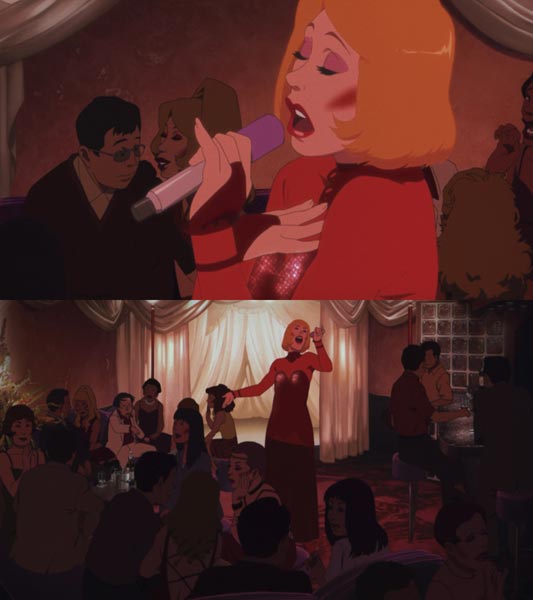
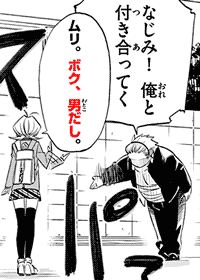
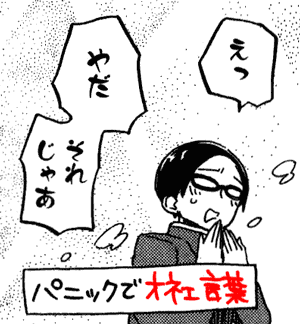
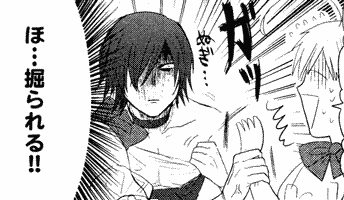
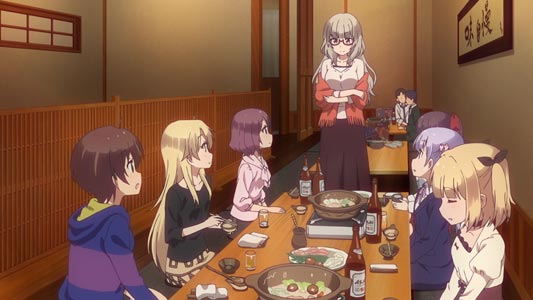
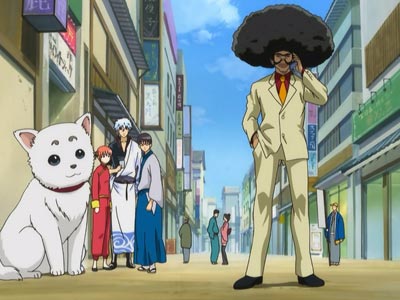
No comments: